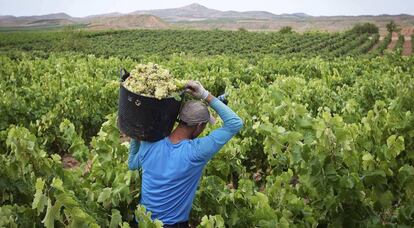The Spanish day laborers and university graduates heading to France to pick grapes
Some 15,000 Spaniards will be heading to the wine-producing areas of France this month

In early September, José Antonio Narváez will head for France to work on his 13th grape harvest. The 31-year old, from the tiny community of Alcalá del Valle, in Cadiz province, made his first trip when he was aged 18, and has only missed one since. “I went with my uncle, who is in charge of the team I work with,” he explains, adding: “Of the 16 in the group, 11 of us are cousins or uncles.” Over the course of the year he also takes part in other harvests: “olive picking or green asparagus: it’s very typical in my village.”
Narváez and his 15 travelling companions are part of the 15,000 or so Spaniards that labor unions say will be heading to France this year to take part in the grape harvest. In 1972, the figure was 96,000, dropping to 10,000 in 1992, when Spain’s economy was enjoying a lengthy period of growth.
Labor unions say that around 20% of first-time grape pickers are aged under 30 and have a university degree.
Labor unions say that most Spaniards who travel to France work overtime, generally bringing their wages up to €2,000
The campaign begins at the end of August and generally lasts a month, although there are areas of France where the harvest extends until the end of October. Celia Estévez says she hopes to travel to France this year for the second time, and has already contacted the head of the team she worked with eight years ago. “He is the guy in the village who deals with this and he said he would see what he can do,” she explains. But with barely two weeks to go before the group leaves, she still hasn’t heard anything. Unemployed, Estévez is aged 28 and lives in Motril, a small seaside town in Granada province. “This year I worked for 20 days selling fruit, and then two weeks in May as a cleaner.
She’s concerned she hasn’t been contacted yet, but says she won’t go without a contract. “It would be crazy to just turn up there,” she says, a view shared by Spain’s two main labor unions, UGT and CO. “Don’t travel without a signed contract from France and don’t go unless there is organized transport,” advises Pedro Hojas of CO.
José Antonio Narváez says he expects to earn around €1,700. Celia says she earned €1,570 for three weeks work, six days a week, from 4.45am to 12.15. The minimum salary this year is €9.67 an hour for a 35-hour week, a significant improvement on Spain, where the minimum wage is €6.50 an hour.
But labor unions say that most Spaniards who travel to France work overtime, generally bringing their wages up to €2,000.
Sign up for our newsletter
EL PAÍS English Edition has launched a weekly newsletter. Sign up today to receive a selection of our best stories in your inbox every Saturday morning. For full details about how to subscribe, click here
The typical Spanish grape picker is male, aged between 30 and 45, with a primary education and experience working in agriculture. Most work in groups of between eight and 20 people.
Of Spain’s regions, Andalusia provides the largest number of workers who head to France each year: 11,000, or 75% of the grape-picking workforce.
English version by Nick Lyne.
Tu suscripción se está usando en otro dispositivo
¿Quieres añadir otro usuario a tu suscripción?
Si continúas leyendo en este dispositivo, no se podrá leer en el otro.
FlechaTu suscripción se está usando en otro dispositivo y solo puedes acceder a EL PAÍS desde un dispositivo a la vez.
Si quieres compartir tu cuenta, cambia tu suscripción a la modalidad Premium, así podrás añadir otro usuario. Cada uno accederá con su propia cuenta de email, lo que os permitirá personalizar vuestra experiencia en EL PAÍS.
¿Tienes una suscripción de empresa? Accede aquí para contratar más cuentas.
En el caso de no saber quién está usando tu cuenta, te recomendamos cambiar tu contraseña aquí.
Si decides continuar compartiendo tu cuenta, este mensaje se mostrará en tu dispositivo y en el de la otra persona que está usando tu cuenta de forma indefinida, afectando a tu experiencia de lectura. Puedes consultar aquí los términos y condiciones de la suscripción digital.








































